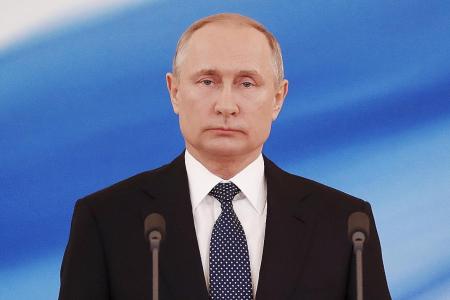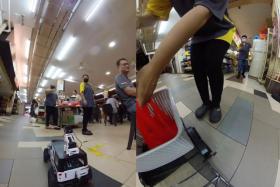How Putin uses the Net to get back at the West
Russian president's vendetta against the West fuelling hybrid warfare tactics, especially on the Internet and social media
Russian President Vladimir Putin has been mad at the West for years.
Indeed, he thought the collapse of the Soviet Union in 1991 was "the greatest geopolitical catastrophe of the century" and has blamed Nato expansion for post-Cold War tensions with Russia.
Like most Russians, he blamed the liberal policies of Mr Mikhail Gorbachev, the last leader of the Soviet Union, for much of the catastrophe.
But Mr Putin also saw the West, especially the US, as unrelenting in its efforts to destroy the country which he, as a KGB officer, had been trained to both venerate and serve.
Meanwhile, his reasons for hating the West have become the constant tropes of Russian propaganda, domestic and foreign.
The West has expanded Nato up to the Russian borders, after promising not to. (On that claim, Mr Putin has half a point.) The West bombed Serbia, Russia's long-time ally. (It did so to prevent worse bloodshed in Kosovo.)
It invaded Iraq, bombed Libya. It supports Ukraine against Russia. It finances Western non-governmental organisations and institutes (many of which have been designated as "foreign agents") in Russia that allegedly oppose his rule and seek to overturn it. (Disclosure: I am chairman of one such NGO.)
It has become clear in the past few years that the Russians (and others, such as the Chinese, typically more cautiously and delicately) are seeking to become experts in hybrid warfare, with a heavy reliance on the Internet and social media.
At an event in London earlier this week hosted by the monthly magazine Prospect, one of Britain's spymasters and a security world intellectual, Sir David Omand, spoke of present and future ways of waging war - warning that they were both harder to counter and more fraught with danger than at the time of the Soviet Union.
As well as its benign, mind-expanding effects, the online world, we have learnt, is the haunt of criminals, con men, pederasts, hate-filled obsessives, liars and various sorts of powers, among which are powerful states which use it for their own ends - including to wage a new kind of war.
The underlying problem is, as Sir Omand remarked, that the Internet's business model is us.
We, who use the Internet usually with neither training nor care, blithely give over vast quantities of information to corporations, to criminals and hostile states who then use it to do harm to us and our countries and our democratic habits.
Computer hacking, once considered a game, now digs away at the already weakened foundations of our liberal democracies.
In the hands of hostile states and organisations, it is used to spread lies about governments, political issues and parties. It takes away what is a necessary condition of a democratic people - the ability to make up one's own mind after considering the evidence.
The joy of the Internet - which remains - is thus deeply compromised. We need protection against such foul play - but also need to protect ourselves, by seeking education, learning proper scepticism and understanding what distinguishes false news and propaganda from facts and honest opinion.
The writer co-founded the Reuters Institute for the Study of Journalism at the University of Oxford, where he is senior research fellow.
Get The New Paper on your phone with the free TNP app. Download from the Apple App Store or Google Play Store now



